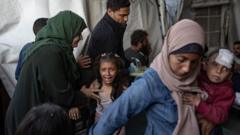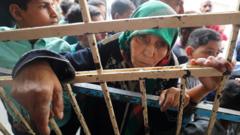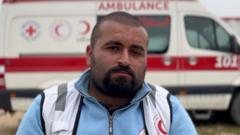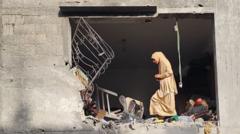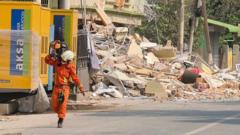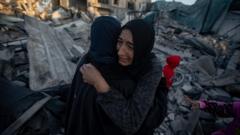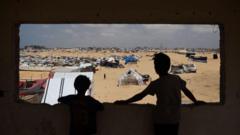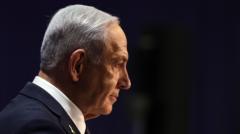Munther Abed, the sole survivor of an Israeli attack that claimed the lives of 15 emergency workers in Gaza, presents a different account of the events, challenging Israel's claims and calling for accountability for the fatal incident.
Gaza Paramedic Challenges Israeli Claims Following Fatal Attack on Colleagues
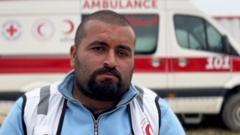
Gaza Paramedic Challenges Israeli Claims Following Fatal Attack on Colleagues
Survivor of deadly assault on emergency responders speaks out, contesting official Israeli narrative.
The narrative surrounding the tragic Israeli attack on paramedics in Gaza is fiercely contested by Munther Abed, the only survivor. On March 23, as Abed lay on the floor of his ambulance to evade gunfire, his colleagues in the front were killed. The attack resulted in the deaths of 15 emergency workers, including eight from the Palestinian Red Crescent, six Civil Defence responders, and a UN staff member.
Abed recounted how their team mobilized at dawn, responding to reports of gunfire and wounded civilians. He noted that as they approached the scene with all lights activated, Israeli forces opened fire, contradicting claims that the vehicles moved suspiciously towards soldiers. The Israeli military alleged that their fire was a counteraction against suspected Hamas militants using ambulances as cover, which Abed categorically denies.
The domestic and international outcry following the attack highlights the emotional toll on the community, with grieving family members decrying the loss of lives in "cold blood." Amidst rising tensions, Abed is adamant that their primary role was to offer humanitarian aid, stating, "We don't belong to any militant group. Our main duty is to offer ambulance services and save people's lives."
The bodies of the victims were found buried in the sand, prompting calls for accountability from various humanitarian organizations. Sam Rose of Unrwa remarked on the barbaric treatment of the deceased, emphasizing the need for a full investigation. As international watch over the humanitarian crisis grows, Abed affirms his determination to reveal the truth about the circumstances that led to the deaths of his colleagues, who he referred to as his second family. With at least 1,060 healthcare workers reportedly killed since the conflict's escalation, the conversation about the safety and security of medics in the region remains critical.
Abed recounted how their team mobilized at dawn, responding to reports of gunfire and wounded civilians. He noted that as they approached the scene with all lights activated, Israeli forces opened fire, contradicting claims that the vehicles moved suspiciously towards soldiers. The Israeli military alleged that their fire was a counteraction against suspected Hamas militants using ambulances as cover, which Abed categorically denies.
The domestic and international outcry following the attack highlights the emotional toll on the community, with grieving family members decrying the loss of lives in "cold blood." Amidst rising tensions, Abed is adamant that their primary role was to offer humanitarian aid, stating, "We don't belong to any militant group. Our main duty is to offer ambulance services and save people's lives."
The bodies of the victims were found buried in the sand, prompting calls for accountability from various humanitarian organizations. Sam Rose of Unrwa remarked on the barbaric treatment of the deceased, emphasizing the need for a full investigation. As international watch over the humanitarian crisis grows, Abed affirms his determination to reveal the truth about the circumstances that led to the deaths of his colleagues, who he referred to as his second family. With at least 1,060 healthcare workers reportedly killed since the conflict's escalation, the conversation about the safety and security of medics in the region remains critical.



